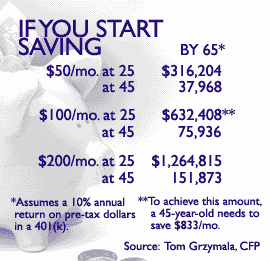|
Debt woes hex Gen X
|
 |
February 18, 2000: 7:30 a.m. ET
Retirement nest eggs can take a beating despite high-flying salaries
By Staff Writer Jeanne Sahadi
|
NEW YORK (CNNfn) - Your college roommate is an IPO millionaire. Your Generation X peers are spearheading the new economy. And the labor market's been sweet to you and your friends. Nevertheless, you find yourself out of pocket way too often.
Sure, you have a decent salary -- maybe even a spectacular one. Financial planners see plenty of Gen Xers making serious money. And your savings scenario is not dismal -- 68 percent of you surveyed by the Employee Benefit Research Institute (EBRI) said you personally had put away something for your later years.
But debt and lack of savings discipline are undermining too many Gen Xers' retirement nest eggs, experts say.
Weigh the ball and chain
The numbers are telling.
The average monthly unpaid credit card balance for people between the ages of 25 and 34 is $2,726 -- more than 10 percent above the national average, according to financial market research firm PSI Global.
American Consumer Credit Service, a nonprofit that helps people negotiate lower interest rates and monthly payments to creditors, reports Gen Xers account for 43 percent of its clients, who carry an average debt load of $22,000.

Certified financial planner Tom Grzymala has to point out to many clients that a 12 percent return on their 401(k) money isn't that great when they're paying 18 percent interest on credit card balances.
Then there are student loans. With education costs soaring, "you walk out of school with a diploma and an I.O.U.," said Don Silver, author of The Generation X Money Book.
The average grad student enters the work force owing $24,479, while the four-year college grad has to pay off a $10,173 bill, according to USA Group, one of the largest U.S. student loan servicers.
Don't rob yourself
One other statistic to keep in mind: despite a consciousness about money issues and retirement planning, the highest percentage of cashed-out 401(k)s and pension plans is among workers between the ages of 20 and 39, according to EBRI.

Some people cash out because they view the amount in their 401(k) as insignificant, especially if they switch jobs after a short tenure, said CFP Mari Adam.
And then there are those who treat their retirement plans like severance packages, said Richard Thau, executive director of Gen X advocacy group Third Millennium.
Either way, you pay penalties and lose out on the benefit of compounding over time, which is your greatest advantage when you're young, regardless of current salary.
If you start saving just $100 a month in pretax dollars when you're 25, you can rack up nearly $1.3 million by the time you turn 65.
Thau said people have to adopt the same mindset about 401(k) money as they do about Social Security - you can't touch it until you retire.
Keep your eye on the clock
Of course, another advantage to youth is the feeling that time will never run out. Well, have you visited your parents lately? Time does run out, and it's too easy to sacrifice your prime investing years to debt.
That's why Adam recommends breaking the rules -- a little. It may seem to make the most financial sense to pay off all your debt before saving, but too often people don't do it quickly enough.
"Some people tend to pay down their credit card and run it up again. Or you lose 12 years of investing time paying off the bills," Adam said.
She and Grzymala both have clients who, alone or with their spouses, bring in well over $100,000 a year, and participate in 401(k) programs, but nevertheless incur debt with the same regularity that they should be saving. Glamorous vacations, frequent dinners out and pricey clothing allowances are just some of their preferred poisons.
Don't be retirement rich and cash poor
No one is suggesting you live a monk's life. That doesn't work for most people.
"Go to a movie every two weeks, but don't go to some spa that costs $400 a day," Grzymala said.
Adam recommends taking a half-and-half approach, where you split your surplus cash every month between your bills and your savings.
"You've got to juggle a lot of things at once," Adam said.
While reducing your debt is the No. 1 priority, she and Silver stressed that you have to balance that with your retirement investing opportunities.
If your employer offers a matching program of 50 percent or more in your 401(k), take full advantage. "It's too good to pass up," Adam said.
But don't max out your 401(k) if it leaves you so cash-poor that you're groping for the credit card to live on. "That's not healthy," she warned.
Post-tax savings a must, too
There are other reasons not to throw all your savings into tax-deferred plans. Even though 401(k) contributions may reduce your current tax bracket, Uncle Sam will come knocking when you retire and his bite is likely to be sharp.
"You need to hedge your bets," Adam said.

For instance, if you want $60,000 a year to live on in retirement, you may need to take far more than that from your 401(k), because you will be taxed at the highest possible bracket and won't have any cash to draw on to pay the tax bill, she said.
That's why it's smart to keep some after-tax money in mutual funds or other investment accounts.
That money also works better for you before retirement, Adam said. You can use it without penalty if you need to put a down payment on a house, or it will continue to work for you in the market even as you use it to collateralize your mortgage. And, when you do cash it out, you probably will be subject only to a long-term capital gains tax of 20 percent.
Automate yourself
But all this is moot unless you develop a strong savings habit. "It's a function of discipline," Thau said.
Part of the discipline is knowing how to make saving as painless as possible.
"People have to get into the habit of doing things by rote," Grzymala advised.
That means first figuring out your expenses and cash flow, cutting back on extravagances, and then setting up automatic deductions from your paycheck and bank account to contribute to your 401(k), invest after-tax money in a brokerage account and pay down your debts.
Actually seeing your savings grow is the best motivator, experts say. To know compounding is to love it.
"You develop pride of ownership," Adam said. "It doesn't take much in your 20s to end up with a lot of money." 
|
|
|
|
|
 |

|

